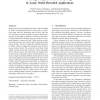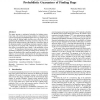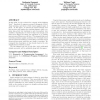452 search results - page 2 / 91 » Finding bugs is easy |
114
click to vote
EUROSYS
2011
ACM
14 years 3 months ago
2011
ACM
Parallel software is increasingly necessary to take advantage of multi-core architectures, but it is also prone to concurrency bugs which are particularly hard to avoid, find, an...
ASPLOS
2010
ACM
15 years 6 months ago
2010
ACM
This paper presents a randomized scheduler for finding concurrency bugs. Like current stress-testing methods, it repeatedly runs a given test program with supplied inputs. Howeve...
ISSTA
2010
ACM
15 years 1 months ago
2010
ACM
In May 2009, Google conducted a company wide FindBugs “fixit”. Hundreds of engineers reviewed thousands of FindBugs warnings, and fixed or filed reports against many of the...
103
click to vote
CSCW
2011
ACM
14 years 6 months ago
2011
ACM
Bug reporting/fixing is an important social part of the software development process. The bug-fixing process inherently has strong inter-personal dynamics at play, especially in h...
110
click to vote
COCO
2005
Springer
15 years 5 months ago
2005
Springer
We prove that if NP ⊆ BPP, i.e., if SAT is worst-case hard, then for every probabilistic polynomial-time algorithm trying to decide SAT, there exists some polynomially samplable ...



